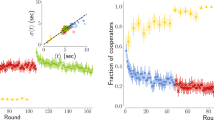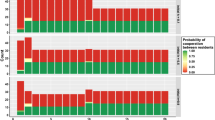Abstract
In the experimental and theoretical literature on social heuristics, the case has been made for dual-process cooperation. Empirical evidence is thought to be consistent with the idea that people tend to be nice before thinking twice. A recent theoretical paper moreover suggests that this is also the type of dual process one would expect from evolution. In ‘Intuition, deliberation, and the evolution of cooperation’ by Bear and Rand1, natural selection never favours agents who use deliberation to override the impulse to defect, while deliberation can be favoured if it serves to undermine cooperation in interactions without future repercussions. Here we show that this conclusion depends on a seemingly innocuous assumption about the distribution of the costs of deliberation, and that with different distributions, dual-process defectors can also evolve. Dual-process defectors intuitively defect, but use deliberation to switch to cooperation when it is in their self-interest to do so (that is, when future repercussions exist). The more general model also shows that there is a variety of strategies that combine intuition and deliberation with Bayesian learning and strategic ignorance. Our results thereby unify and generalize findings from different, seemingly unrelated parts of the literature.
This is a preview of subscription content, access via your institution
Access options
Access Nature and 54 other Nature Portfolio journals
Get Nature+, our best-value online-access subscription
$29.99 / 30 days
cancel any time
Subscribe to this journal
Receive 12 digital issues and online access to articles
$119.00 per year
only $9.92 per issue
Buy this article
- Purchase on Springer Link
- Instant access to full article PDF
Prices may be subject to local taxes which are calculated during checkout




Similar content being viewed by others
References
Bear, A. & Rand, D. G. Intuition, deliberation and the evolution of cooperation. Proc. Natl Acad. Sci. USA 113, 936–941 (2016).
Hamilton, W. D. The genetical evolution of social behaviour. J. Theor. Biol. 7, 1–16 (1964).
van Veelen, M., Allen, B., Hoffman, M., Simon, B. & Veller, C. Hamilton’s rule. J. Theor. Biol. 414, 176–230 (2017).
Richerson, P. J. & Boyd, R. Not By Genes Alone: How Culture Transformed Human Evolution (Chicago Univ. Press, 2005).
Szabó, G. & Fath, G. Evolutionary games on graphs. Phys. Rep. 446, 97–216 (2007).
Allen, B. et al. Evolutionary dynamics on any population structure. Nature 544, 227–230 (2017).
Axelrod, R. & Hamilton, W. D. The evolution of cooperation. Science 211, 1390–1396 (1981).
Bendor, J. & Swistak, P. Types of evolutionary stability and the problem of cooperation. Proc. Natl Acad. Sci. USA 92, 3596–3600 (1995).
García, J. & van Veelen, M. In and out of equilibrium I: evolution of strategies in repeated games with discounting. J. Econ. Theory 161, 161–189 (2016).
van Veelen, M., García, J., Rand, D. G. & Nowak, M. A. Direct reciprocity in structured populations. Proc. Natl Acad. Sci. USA 109, 9929–9934 (2012).
Frank, R. H. Passions within Reason: The Strategic Role of The Emotions (W. W. Norton, 1988).
McNamara, J. M., Barta, Z., Fromhage, L. & Houston, A. I. The coevolution of choosiness and cooperation. Nature 451, 189–192 (2008).
Fujiwara-Greve, T. & Okuno-Fujiwara, M. Voluntarily separable repeated prisoner’s dilemma. Rev. Econ. Stud. 76, 993–1021 (2009).
Izquierdo, S. S., Izquierdo, L. R. & Vega-Redondo, F. The option to leave: conditional dissociation in the evolution of cooperation. J. Theor. Biol. 267, 76–84 (2010).
Baumard, N., André, J.-B. & Sperber, D. A mutualistic approach to morality: the evolution of fairness by partner choice. Behav. Brain Sci. 36, 59–78 (2015).
Jordan, J. J., Hoffman, M., Bloom, P. & Rand, D. G. Third-party punishment as a costly signal of trustworthiness. Nature 530, 473–476 (2016).
Rand, D. G. Cooperation, fast and slow: meta-analytic evidence for a theory of social heuristics and self-interested deliberation. Psychol. Sci. 27, 1192–1206 (2016).
Rubinstein, A. Instinctive and cognitive reasoning: a study of response times. Econ. J. 117, 1243–1259 (2007).
Rand, D. G., Greene, J. D. & Nowak, M. A. Spontaneous giving and calculated greed. Nature 489, 427–430 (2012).
Zaki, J. & Mitchell, J. P. Intuitive prosociality. Curr. Dir. Psychol. Sci. 22, 466–470 (2013).
Rand, D. G. et al. Social heuristics shape intuitive cooperation. Nature Commun. 5, 3667 (2014).
Myrseth, K. O. R. & Wollbrant, C. E. Cognitive foundations of cooperation revisited: commentary on Rand et al. (2012, 2014). J. Behav. Exp. Econ. (in the press).
Bouwmeester, S. et al. Registered replication report: Rand, Greene & Nowak (2012). Perspect. Psychol. Sci. 12, 527–542 (2017).
Hutcherson, C. A., Bushong, B. & Rangel, A. A neurocomputational model of altruistic choice and its implications. Neuron 87, 451–462 (2015).
Recalde, M. P., Riedl, A. & Vesterlund, L. Error Prone Inference from Response Time: The Case of Intuitive Generosity in Public-Good Games (Univ. Pittsburgh, 2015); http://www.econ.pitt.edu/sites/default/files/working_papers/WP%2015-004.pdf
Delton, A. W., Krasnow, M. M., Cosmides, L. & Tooby, J. Evolution of direct reciprocity under uncertainty can explain human generosity in one-shot encounters. Proc. Natl Acad. Sci. USA 108, 13335–13340 (2011).
Hoffman, M., Yoeli, E. & Nowak, M. Cooperate without looking: why we care what people think and not just what they do. Proc. Natl Acad. Sci. USA 112, 1727–1732 (2015).
Bear, A., Kagan, A. & Rand, D. G. Co-evolution of cooperation and cognition: the impact of imperfect deliberation and context-sensitive intuition. Proc. R. Soc. B 284, 20162326 (2017).
Metz, J., Geritz, S., Meszéna, G., Jacobs, F. & van Heerwaarden, J. Adaptive Dynamics: A Geometrical Study of the Consequences of Nearly Faithful Reproduction Vol. 12, 183–231 (Elsevier, 1996).
Dieckmann, U. & Law, R. The dynamical theory of coevolution: a derivation from stochastic ecological processes. J. Math. Biol. 34, 579–612 (1996).
Dercole, F. & Rinaldi, S. Analysis of Evolutionary Processes: The Adaptive Dynamics Approach and Its Applications (Princeton Univ. Press, 2008).
Hilbe, C., Hoffman, M. & Nowak, M. Cooperate without looking in a non-repeated game. Games 6, 458–472 (2015).
Pérez-Escudero, A., Friedman, J. & Gore, J. Preferential interactions promote blind cooperation and informed defection. Proc. Natl Acad. Sci. USA 113, 13995–14000 (2016).
Jordan, J. J., Hoffman, M., Nowak, M. A. & Rand, D. G. Uncalculating cooperation is used to signal trustworthiness. Proc. Natl Acad. Sci. USA 113, 8658–8663 (2016).
Acknowledgements
This paper benefited from the suggestions of audiences at the Amsterdam Brain and Cognition Symposium (Universiteit van Amsterdam), at the Gummersbacher Kolloquium (Heinrich Heine Universität Düsseldorf) and at the UECE Lisbon Meetings in Game Theory and Applications (Instituto Superior de Economia e Gestão, Lisbon). We thank A. Bear and D. Rand for comments. Financial support of the Research Priority Area Behavioral Economics of the University of Amsterdam is gratefully acknowledged. The funders had no role in study design, data collection and analysis, decision to publish, or preparation of the manuscript.
Author information
Authors and Affiliations
Contributions
S.J. and M.v.V. designed research, performed research and wrote the paper.
Corresponding author
Ethics declarations
Competing interests
The authors declare no competing interests.
Supplementary information
Supplementary Information
Supplementary Methods 1–3, Supplementary Figures 1–14, Supplementary References (PDF 1249 kb)
Rights and permissions
About this article
Cite this article
Jagau, S., van Veelen, M. A general evolutionary framework for the role of intuition and deliberation in cooperation. Nat Hum Behav 1, 0152 (2017). https://doi.org/10.1038/s41562-017-0152
Received:
Accepted:
Published:
DOI: https://doi.org/10.1038/s41562-017-0152
This article is cited by
-
Super-additive cooperation
Nature (2024)
-
Assortativity in cognition
Scientific Reports (2023)
-
Does similarity trigger cooperation? Dyadic effect of similarity in social value orientation and cognitive resources on cooperation
Current Psychology (2023)
-
Cooperating with the future through natural resources restoration
Sustainability Science (2021)
-
Globalization and the rise and fall of cognitive control
Nature Communications (2020)



